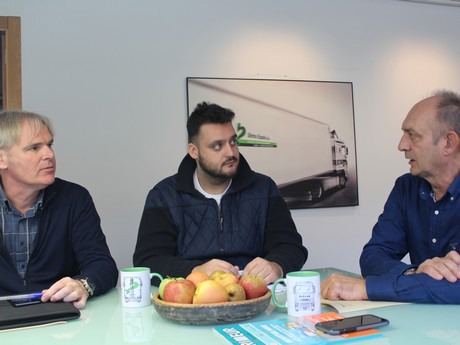More than 27 years ago, Betrex España was founded in Valencia. The transport agency takes care of the transport of fruit and vegetables from Spain to the north of Europe and vice versa. Over the years, the company became specialised in grouped transport.
Gerard Mostert was working in the fresh produce sector when he was offered a job in Spain when he was 33. He had earlier already spend a long period in the Southern European country. He had enjoyed this so much, he decided to take the opportunity. “The company was started as a post of two Dutch transport companies. In 1991 the first transport mediations were conducted, and five years later I took over the transport agency as a one-man business,” the now 60 year old manager of Betrex España says.

In the period when Betrex España was founded, Spain was an emerging country for Dutch fresh produce importers. “The citrus trade had been around longer, but Spanish vegetables were imported more and more as well. That’s why the need arose to start a transport agency on location. In the first years, we mostly did the transport of fruit and vegetables from Spain to the Netherlands, and vice versa, but that has changed over the years.” Gerard says the focus is still on fruit and vegetable transport from Spanish production regions to the Netherlands and Belgium. “That’s where our roots are, and that will always be the case. Additionally, we also drive to the western Ruhr Area, France, the UK and Switzerland.”
Considerable increase of grouped transport
Every day, about 30 cars are on the road for Betrex España. The company has a number of their own lorries, and they work with transporters who always drive for them. Besides, if necessary, they can call on a permanent group of drivers. An important change is that the company has started doing more and more grouped transport. “You could now say we’re specialised in this. We once started with the idea of doing return shipments for Spain - the Netherlands. The transport therefore consisted mostly of full cars, while we now take care of partial shipments.”
Expansion of the grouped transport was inevitable for the company. Although people used to order a complete shipment for unloading on Mondays, multiple unloading moments are desired nowadays. “We look for additional partial batches, and that isn’t always easy. You want to do as few additional miles as possible, and you have to keep in mind the driving time, so that products don’t have to be loaded and unloaded multiple times. Years ago, we sometimes gave a little extra to fill up the car, but customers now order an x number of pallets, and that can’t be changed,” Gerard mentions. “Additional costs are quick to accumulate, but filling up the cargo isn’t an option either. Margins would be under even more pressure. It’s quite challenging to find affordable solutions.”
The mediation in return shipments has turned into its own department. The products to be shipped are varied: from fresh produce and meat to electronics and shoes. “That’s why you could now speak of a logistic service provider instead of an agency, but we remain unlimited in our options precisely because we’re an agency.” Forced or not, grouped transport is an important reason why people know how to find Betrex España. “Our background in fresh produce is another advantage. We know how important it is to inform the receiver about the condition of the products, arrival times et cetera. Besides, we speak different languages, so that we’re able to communicate with a lot of customers in their own language. That is appreciated.”
According to Gerard, another difference compared to years ago, is that a lot of customers inform them about the requested orders in advance. “In the past we got a lot of ad hoc questions, but a large part of the orders are already known in advance now, which is beneficial to scheduling.” However, he mentions that it hasn’t become any easier in the transport sector in general. The shortage of good drivers is also causing problems in Spain. “In the past we were called for work often enough, but that’s happening much less now. The relatively low wages aren’t exactly making the driver’s trade appealing, and the stricter controls regarding the laws of driving times aren’t beneficial either.”
Planning for unloading moments
Besides, competition has become more severe. Yet Gerard says he isn’t worried about this. “There will always be someone cheaper. We think it’s mostly important to do it better, or to offer our services to the satisfaction of the customer at decent prices. Flexibility also plays an important role in that. Thirty years ago we had never heard of grouped cargo before. Now, 70 per cent of what we do is partial shipments. We expect even more is going to change in the coming years.” He means that focus has shifted from the moment of delivery to the moment of departure, among other things. The logistic service provider regularly goes to large distribution centres, where they already have to keep in mind fixed unloading times.
He expects he’ll have to deal with this even more often in future. “What’ll happen when you’re not on time? All in all, we’re headed for a more planned schedule. Secure car parks, for instance, have to be booked in advance, but if you can’t be on time due to busy roads, you’ll have a problem. Everything is being automated, and that doesn’t leave much room for mitigating circumstances.”
More information:
Betrex España
Gerard Mostert
gmostert@betrex.es
www.betrex.es
